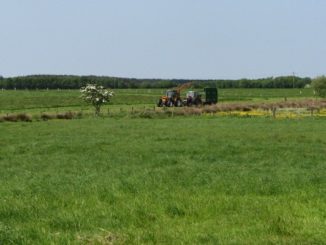
Further exemptions to environmental measures, slashing on-farm checks and a get-out-of-jail free card for farmers that miss requirements due to exceptional circumstances. These are just some of the suggestions put forward by the Commission as part of efforts to lighten the administrative load on farmers. Natasha Foote has the details.
The suggestions, which were published on Thursday (22 February), lists a range of short- and mid-term actions intended to simplify and streamline bureaucratic burdens.
The recommendations come as part of the ‘simplification package’ promised by Commission President Ursula von der Leyen in efforts to placate protesting farmers. They will then serve as the “basis for discussions and joint action with EU countries,” according to a Commission statement.
So what could end up on the simplification menu? ARC breaks down the key points to know.
Environmental rule amendments
Compliance with environmental conditionality requirements have “proven challenging” to implement, according to the Commission. As such, the EU executive proposes amending the so-called GAEC 1 environmental measure, which requires farmers to keep areas of permanent grassland in the EU stable compared to 2018 levels.
According to the Commission, this requirement has pushed livestock farmers to reconvert arable land into permanent grassland, something they say may lead to loss of income for the farmers concerned.
As such, it proposes to amend these rules by mid-March to ensure “fewer areas would have to be reconverted into permanent grassland”.
The Commission will also review the obligation to cover soils under GAEC 6.
While this goes someway in meeting the demands set out by member states, it is unlikely to satisfy EU countries, who called for more GAECs to be on the chopping block.
In a document setting out their demands, seen by ARC, member states called for reconsideration of GAECs 2 (on the protection of wetlands and peatlands), 6 (maintenance of soil organic matter), 7 (on crop rotation) and 8 (on fallow land). (Many of these are repeated or summarised in the annex to the Commission proposal above too)
This is because farmers are “overwhelmed by the complexity of the conditionality, its standards, its restrictions and the accompanying system of control and sanctions,” the document reads.
However, the Commission added that, should the basic regulations be changed in the mid-term, GAECs 6,7 and 8 could also be up for grabs.
Checks and balances
The Commission has also outlined an aim to reduce the number of on-farm visits by national administrations by up to 50%. This is likely to go down well with member states, given that it is one of their key demands.
Meanwhile, in the longer term, the Commission proposes an exemption of small farms of under 10 hectares from controls on environmental compliance. This would “significantly simplify the daily work of small farmers,” the Commission statement reads.
Force majeure
The Commission proposes to clarify the use of the concept of force majeure and exceptional circumstances.
This means farmers that cannot fulfil all their CAP requirements due to “exceptional and unforeseeable” events outside their control – such as severe droughts or floods – do not have penalties imposed on them. This is intended to “improve the certainty of getting CAP support for farmers impacted by such unfortunate events”.
This suggestion may have worked its way in via EU Agriculture Commissioner Janusz Wojciechowski, who sent a letter this week to the Commission President with his personal suggestions for the way forward.
In the letter, seen by ARC, the Commissioner calls for the “exemption of penalties on the application of penalties in case of noncompliance with rules on GAEC” for farmers, calling measures to set aside 4% of land fallow, crop rotation and winter cover crops a “oppressive and costly character of conditionality”.
Info gathering
The Commission will also launch an online survey directly addressed to farmers in March. This is designed to identify their main sources of concern and help the EU executive understand the sources of administrative burden and complexity.
Meanwhile, the Commission also encouraged stakeholders to share their view on the administrative burden that may be linked to the Nitrates Directive via the online public consultation. This comes on the back of a letter sent from Dutch Prime Minister Mark Rutte earlier this week.
Seen by ARC, the letter calls for a loosening of the rules around the use of animal manure-based fertilisers, created via a process known as REcovered Nitrogen from manURE (RENURE), to allow their above the threshold currently stipulated by the directive.
Exemptions on RENURE form a key part of a deal that was struck with Belgian farmers at the end of last week to bring the farmers’ protests to a close.
Digging deeper
Having announced all of this, the Commission notes in the last paragraph of both the document and webpage, that the farmers are “often the most vulnerable link in the food value chain”, and adds that it is working on “actions to improve the position of farmers in the food chain and protect them against unfair trading practices”.
Common threads of discontent between farming factions protesting since the beginning of the year are inequitable pricing structures coupled with unfair competition from imports and free trade agreements. The Commission was light on the details of tackling this, but suggested these actions may cover issues such as market transparency, trading practices in the value chain, costs of production, or more homogeneous control of existing rules on imported agricultural products.
These will be presented “shortly’.
What to watch
The recommendations will now be discussed with EU agriculture ministers in their meeting on Monday (26 February) and serve as the “basis for discussions and joint action with EU countries,” according to a Commission press release.
However, there are a number of key points raised by the Council that do not feature in the Commission’s suggestions and, with politicians scrambling to find ways to soothe the farmers’ concern, may well make their way onto the negotiating table.
- The first of these is for more funding flexibility, especially for the use of unspent CAP funds, between the different pillars of the EU farming subsidies programme.
- Something to watch is also whether social conditionality gets thrown into the mix, given that member states have called for postponing the implementation of social conditionality in the CAP.
- One of the main innovations of this CAP, this would make subsidies conditional on upholding working and employment standards, and is set to be compulsory from 2025.
Another suggestion that could work its way into discussions is one from EU Agriculture Commissioner Janusz Wojciechowski, who called for bolstering the CAP budget with national budgets via state aid to adjust subsidies for inflation.
Asked by ARC, a representative for the Commissioner said that the proposals “have been taken on board and are being considered by the President”.
More
EPP’s Von der Leyen Launches Second Term Bid without Mentioning Farmers – Once.
Brussels Round up – Mirror Clauses, Mixed Messages & Farm to Facts
Parliament greenlights plans to loosen EU rules on new GMOs – but with key conditions






